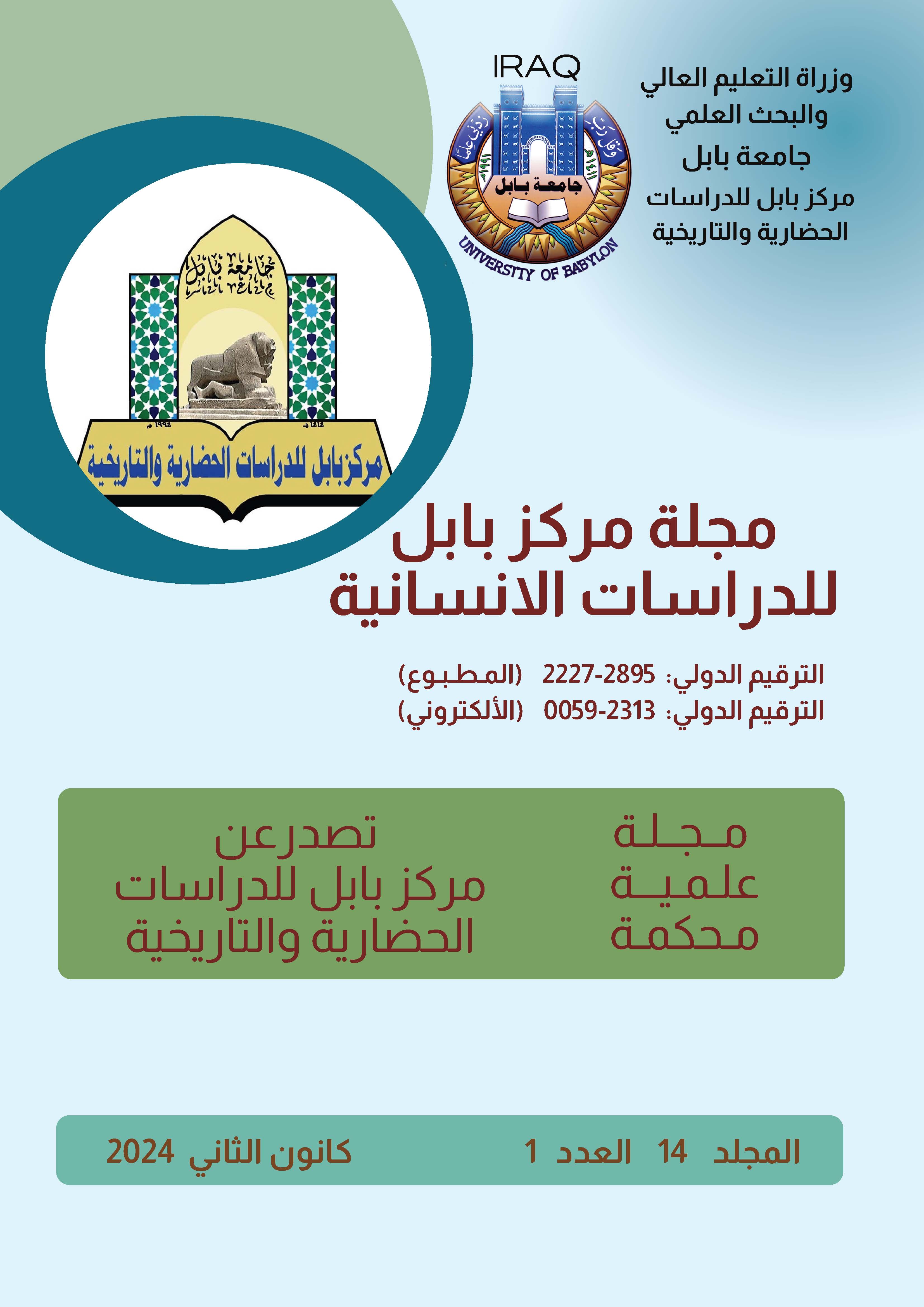اتجاهات طلبة قسم التربية الفنية نحو التعليم الالكتروني
الكلمات المفتاحية:
اتجاهات الطلبة - التربية الفنية – التعليم الالكترونيالملخص
يتناول البحث الموسوم (اتجاهات طلبة قسم التربية الفنية نحو التعليم الالكتروني) تطور الحياة الإنسان وانتقال التعليم من الماضي الى الحاضر واهتمامه بالتطور التكنولوجي، واسلوب تلقي المعلومات التي يمارسها المتعلم حسب قدراته وسرعته ومستوى وارتكازه على ما لديه من خبرات ومهارات يمتلكها وعلى الرغم من الفوائد الكثيرة ولكن هناك صعوبات يواجهها الطالب وتؤدي الى عرقلة تعليمه.
تناول الباحثان في الفصل الأول مشكلة البحث: ما هي اتجاهات طلبة قسم التربية الفنية نحو التعليم الالكتروني ؟ وكذلك ماهي اتجاهات طلبة قسم التربية الفنية نحو التعليم الالكتروني من حيث النوع ذكور واناث ؟، اما بالنسبة لأهمية البحث فهو يعمل في مجال التعليم الذاتي أي الاعتماد على النفس ، وايضا يحل مشاكل كثيرة منها توفير الوقت والجهد ويجنب الأماكن المزدحمة في القاعات الدراسية، وهدف البحث هو تعرف اتجاهات طلبة قسم التربية الفنية نحو التعليم الالكتروني.
والفصل الثاني اشتمل على المبحث الأول التعليم الالكتروني، والمبحث الثاني الاتجاهات السيكولوجية (النفسية) لطلبة قسم التربية الفنية، اما الفصل الثالث إجراءات البحث فقد تم اعتماد المنهج المسحي الوصفي لكونه يصف الواقع الحالي فيما يتعلق باتجاهات طلبة قسم تربية الفنية نحو التعليم الالكتروني وشمل مجتمع البحث الحالي طلبة قسم التربية الفنية/جامعة الكوفة/ كلية التربية للعام الدراسي/ (2019-2020) للدراسة الصباحية والبالغ عددهم 197 طالب وطالبة.
كما اختار الباحثان عينة عشوائية وتم اختيار نسبة (20%) وبذلك بلغ عدد افراد العينة البحث (41)طالب وطالبة فبلغ عدد الذكور الكلي (8) وعدد الاناث الكلي (33) وتم استخدام استبانه من اجل تحقيق هدف البحث الذي يتكون من (40)فقرة وفق مقياس لكرت الخماسي (موافق بشدة –موافق –غير متاكد –غير موافق –غير موافق بشدة ) ويتضمن البحث على صدق الأداة والثبات الأداة والوسائل الإحصائية المستخدمة والفرضيات والمتغيرات الدراسة، والفصل الرابع تضمن نتائج البحث النتائج المتعلقة بالسؤال الأول ما هي اتجاهات طلبة قسم التربية الفنية نحو التعليم الالكتروني ؟ على الرغم من مميزات التعليم الالكتروني ولكن هناك صعوبات واجهت الطالب مما أدى الى عدم تقبله وارفض لهذه الطريقة من التعليم بشكل عام تشير الى اتجاهات سلبية نحو تطبيقات التعليم الالكتروني حيث بلغ عدد الفقرات التي كانت متوسطها الحسابي اقل من المتوسط الافتراضي (3) هو (31)فقرة في حين بلغ عدد الفقرات التي اكبر من المتوسط الافتراضي (3) هو (10) فقرة حيث تشير النتائج بشكل واضح ان اتجاهات طلبة قسم التربية الفنية –الصباحي في كلية التربية، جامعة الكوفة نحو هذا النوع من التعليم كان ذي طابع سلبي النتائج المتعلقة بالسؤال الثاني اتجاهات طلبة قسم التربية الفنية نحو التعليم الالكتروني من حيث النوع ذكور وإناث ؟ حيث ان كثير من النتائج تشير إلى عدم وجود فروق معنوية ذات دلالة إحصائية عند مستوى الدلالة (0.05=α) في اتجاهات طلبة قسم التربية الفنية نحو التعليم الالكتروني تعزى لمتغيرات الجنس ذكور وإناث اي نقبل الفرضية الصفرية وظهرت الفروق بين الذكور والإناث في الفقرتين (19)( التعليم الالكتروني يقلل من التفاعل بين المعلم والمتعلم) ،والفقرة (40) ( أرى إن التعليم الالكتروني يزيد من تقدير المتعلم للتعلم )حيث عند تلك الفقرتين كان sig اقل من مستوى الدالة (α) في هذه الفقرتين ترفض فرضية العدم وتقبل بالفرضية البديلة .
الاستنتاجات مما يدل بشكل واضح وجلي على اتجاهات طلبة قسم التربية الفنية نحو التعليم الالكتروني سلبي وذلك لصعوبة تعامل الطلبة في بداية مشوارهم مع الوسائل الالكترونية والبرامج على الرغم ان بعضهم لا يمتلكون الخبرة الكافية في هذا المجال ،وضعف البنية التحتية ،وعدم قدرة الطلبة على التعلم الذاتي والاعتماد على النفس اي ليس لديهم مهارة في التعلم الالكتروني، وصعوبة في استخدام البرامج الالكترونية وذلك لضعف تمكنهم من اللغة الانكليزية .







